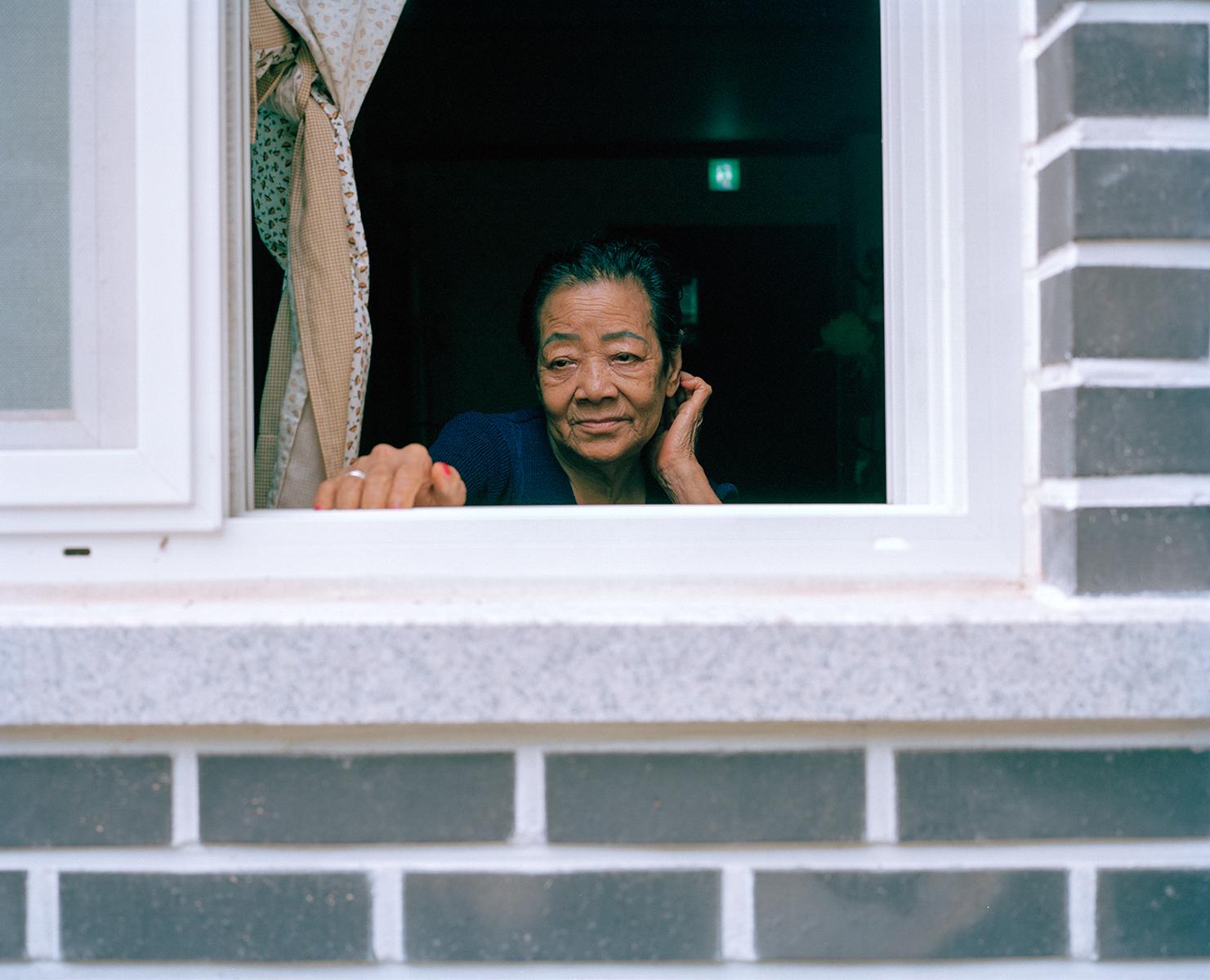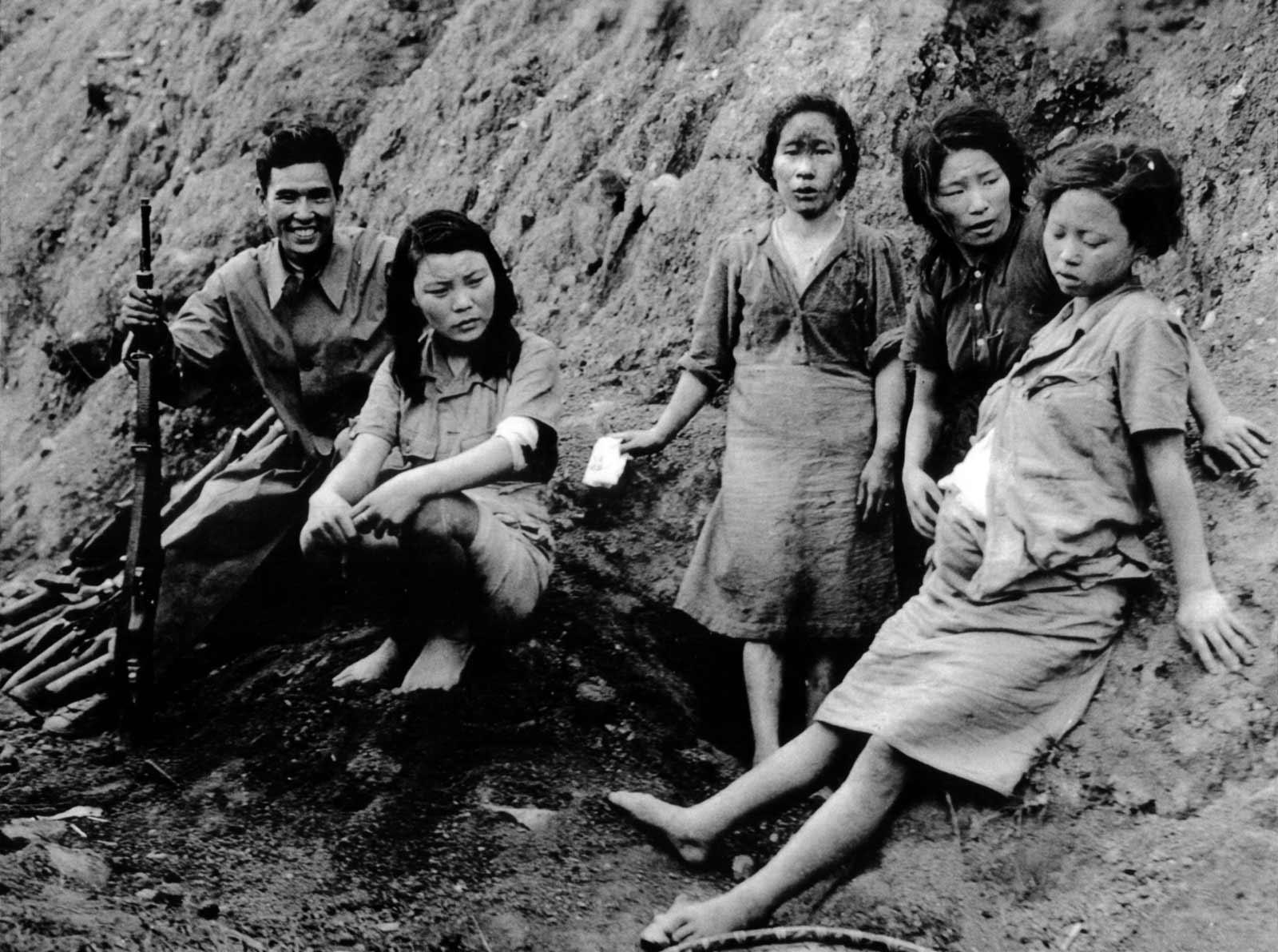
Kim Hwa Seon Halmoni looking out, House of Sharing, Gwangju, South Korea, 2010
"Comfort Women" (2010-2011)
When the first survivor, Kim Hak Soon, came forward in 1991 as having been a “comfort woman” for the Japanese Imperial Army during WWII, her testimony inspired countless others to come out and share their own stories. Today we call them “halmonis” meaning “grandmothers”, a term of endearment in Korea, rather than “comfort women” since that was a term coined by the Japanese to imply consent, when they were either kidnapped or lured by false pretenses of jobs abroad.
Despite the overwhelming number of testimonies and historical evidence to support their claims, no apology or legal reparations were offered by the Japanese government. Still today, Japan has not formally apologized or legally recognized their role in institutionalized sexual slavery during WWII. They have been protesting in front of the Japanese embassy in Seoul every Wednesday since 1992.
In December, 2011, worldwide protests were held in a massive showing of solidarity with “comfort women” in honor of their 1000th protest, the longest running protest in history. After visiting the first memorial in the United States dedicated to Korean "comfort women" in New Jersey, Yi Ok Seon and Lee Yong Soo gave their testimonies alongside two former Holocaust survivors, Hanne Liebmann and Ethel Katz.
All four shared their stories, and although they were separated by thousands of miles, their suffering was strikingly similar. They all spoke of discrimination, physical and psychological abuse, separation from family, hunger, humiliation, and uncertainty. Lee Yong Soo continues her activism because she believes “one of the reasons we have so much sexual violence in this world is that the crimes such as those committed by Japan has not been completely resolved. But I am here to tell you in person what happened and what Japan did because I don’t want to see this happen again to the next generation.” Now there are only 10 survivors remaining.
Publications
How do you take a picture of happiness? We asked photographers to surprise us, NPR, Mar 19, 2023
Don't Erase My History and Don't Sell My Picture, The Wrath-Bearing Tree, July 6, 2020
Exhibitions
Photoville, Brooklyn, NY, 2022
Krasnoyarsk Museum, Krasnoyarsk, Russia, 2021
IX International Festival of Contemporary Photography, Novosibirsk, Russia, 2021
National Museum of Korean Contemporary History, Seoul, South Korea, 2017
Daejeon Culture and Art Foundation, Daejeon, South Korea, 2017
Daegu Arts Center, Daegu, South Korea, 2017
Gwangju City Hall, Gwangju, South Korea, 2017
History Museum of Sexual Slavery, Gwangju, South Korea, 2015-present
Corcoran Gallery of Art, Washington, DC, 2012
The Camera Club of New York, 2011
Harriet and Kenneth Kupferberg Holocaust Resource Center, Queens, NY, 2011
SOHO20 Gallery, NYC, 2011
RabbitHole Gallery, NYC, 2011
When the first survivor, Kim Hak Soon, came forward in 1991 as having been a “comfort woman” for the Japanese Imperial Army during WWII, her testimony inspired countless others to come out and share their own stories. Today we call them “halmonis” meaning “grandmothers”, a term of endearment in Korea, rather than “comfort women” since that was a term coined by the Japanese to imply consent, when they were either kidnapped or lured by false pretenses of jobs abroad.
Despite the overwhelming number of testimonies and historical evidence to support their claims, no apology or legal reparations were offered by the Japanese government. Still today, Japan has not formally apologized or legally recognized their role in institutionalized sexual slavery during WWII. They have been protesting in front of the Japanese embassy in Seoul every Wednesday since 1992.
In December, 2011, worldwide protests were held in a massive showing of solidarity with “comfort women” in honor of their 1000th protest, the longest running protest in history. After visiting the first memorial in the United States dedicated to Korean "comfort women" in New Jersey, Yi Ok Seon and Lee Yong Soo gave their testimonies alongside two former Holocaust survivors, Hanne Liebmann and Ethel Katz.
All four shared their stories, and although they were separated by thousands of miles, their suffering was strikingly similar. They all spoke of discrimination, physical and psychological abuse, separation from family, hunger, humiliation, and uncertainty. Lee Yong Soo continues her activism because she believes “one of the reasons we have so much sexual violence in this world is that the crimes such as those committed by Japan has not been completely resolved. But I am here to tell you in person what happened and what Japan did because I don’t want to see this happen again to the next generation.” Now there are only 10 survivors remaining.
Publications
How do you take a picture of happiness? We asked photographers to surprise us, NPR, Mar 19, 2023
Don't Erase My History and Don't Sell My Picture, The Wrath-Bearing Tree, July 6, 2020
Exhibitions
Photoville, Brooklyn, NY, 2022
Krasnoyarsk Museum, Krasnoyarsk, Russia, 2021
IX International Festival of Contemporary Photography, Novosibirsk, Russia, 2021
National Museum of Korean Contemporary History, Seoul, South Korea, 2017
Daejeon Culture and Art Foundation, Daejeon, South Korea, 2017
Daegu Arts Center, Daegu, South Korea, 2017
Gwangju City Hall, Gwangju, South Korea, 2017
History Museum of Sexual Slavery, Gwangju, South Korea, 2015-present
Corcoran Gallery of Art, Washington, DC, 2012
The Camera Club of New York, 2011
Harriet and Kenneth Kupferberg Holocaust Resource Center, Queens, NY, 2011
SOHO20 Gallery, NYC, 2011
RabbitHole Gallery, NYC, 2011

Chinese soldier with Korean ‘comfort women’ after they were...
READ ON
Chinese soldier with Korean ‘comfort women’ after they were liberated by US-China Allied Forces, Songshan, Yunnan Province, China. September 3, 1944 Photo by Charles H. Hatfield, U.S. 164th Signal Photo Company, US National Archives

Lee Ok Seon Halmoni in the doorway, House of Sharing, Gwangju, South Korea, 2010

Massages, House of Sharing, Gwangju, South Korea, 2010

Park Ok Seon Halmoni and umbrellas, House of Sharing, Gwangju, South Korea, 2010

Kang Il Chul Halmoni in her garden, House of Sharing, Gwangju, South Korea, 2010

Kim Hwa Seon Halmoni in the mirror, House of Sharing, Gwangju, South Korea, 2010

Kim Soon Ok Halmoni in her room, House of Sharing, Gwangju, South Korea, 2010

Bae Choon Hui Halmoni and flowers, House of Sharing, Gwangju, South Korea, 2010

Park Ok Seon Halmoni napping, House of Sharing, Gwangju, South Korea, 2010

Lee Ok Seon Halmoni reflected, House of Sharing, Gwangju, South Korea, 2010

Kim Hwa Seon Halmoni's room, House of Sharing, Gwangju, South Korea, 2010

Kim Hwa Seon Halmoni with visitors, House of Sharing, Gwangju, South Korea, 2010

Kang Il Chul Halmoni, House of Sharing, Gwangju, South Korea, 2010

Kang Il Chul Halmoni as a young nurse, House of Sharing, Gwangju, South Korea, 2010

Lee Ok Seon Halmoni at the first "comfort women" dedication...
READ ON
Lee Ok Seon Halmoni at the first "comfort women" dedication ceremony, Palisades Park, NJ, 2011

Lee Ok Seon Halmoni and Lee Yong Soo Halmoni posing for photos after the...
READ ON
Lee Ok Seon Halmoni and Lee Yong Soo Halmoni posing for photos after the ceremony, Palisades Park, NJ, 2011

Lee Ok Seon Halmoni and Lee Yong Soo Halmoni giving their testimonies...
READ ON
Lee Ok Seon Halmoni and Lee Yong Soo Halmoni giving their testimonies alongside Holocaust survivors Hanne Liebmann and Ethel Katz, Kupferburg Holocaust Center, Queens, NY, 2011

Lee Yong Soo Halmoni and Ethel Katz embracing, Kupferburg Holocaust Center, Queens, NY, 2011